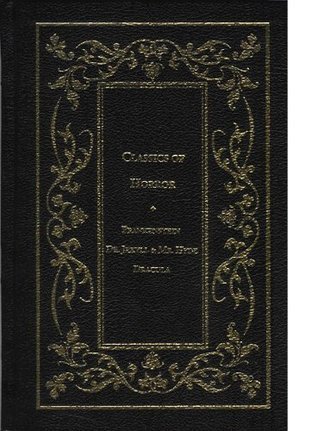
Classics of Horror : Frankenstein; The Strange Case of Dr. Jekyll and Mr. Hyde; Dracula
Book Description
Darkness lurks in the shadows, where science and ambition collide with the human soul. Join the tormented Victor Frankenstein as he grapples with the monster of his own making, while the duality of mankind unfolds through the chilling tale of Dr. Jekyll and his sinister alter ego, Mr. Hyde. Meanwhile, the seductive yet deadly allure of Count Dracula sweeps across the landscape of fear and desire. These iconic stories pulse with tension, exploring love, betrayal, and the haunting consequences of unchecked ambition. What happens when humanity's darkest secrets claw their way to the surface?
Quick Book Summary
"Classics of Horror" brings together three foundational gothic novels: Mary Shelley's "Frankenstein," Robert Louis Stevenson’s "The Strange Case of Dr. Jekyll and Mr. Hyde," and Bram Stoker’s "Dracula." Within these tales, readers are confronted with the consequences of unchecked ambition, the duality of human nature, and the enduring clash between science, morality, and superstition. Victor Frankenstein’s tragic quest for discovery gives rise to a being he cannot control. Dr. Jekyll’s experiment unearths the monstrous shadow within himself, while Count Dracula traverses Europe, spreading terror and testing the boundaries of desire and evil. United by themes of fear, identity, and transgression, these masterpieces continue to shape the landscape of horror and gothic fiction, lingering in the imagination through their exploration of humanity’s most profound anxieties.
Summary of Key Ideas
Table of Contents
The Consequences of Unchecked Ambition
In "Frankenstein," Mary Shelley explores the perils of overreaching ambition and the Promethean pursuit of forbidden knowledge. Victor Frankenstein, driven by an insatiable desire to unlock the secrets of life, creates a living being from dead matter. But his refusal to accept responsibility for his creation leads to catastrophic consequences. The narrative delves into the anguish of both creator and creature, illuminating themes of alienation, social rejection, and the ethical responsibilities inherent in scientific discovery.
Duality and the Human Psyche
Robert Louis Stevenson’s "The Strange Case of Dr. Jekyll and Mr. Hyde" investigates the battle within the human psyche between good and evil. Dr. Jekyll, a respected physician, concocts a potion to separate his virtuous self from his darker impulses, unwittingly giving rise to the monstrous Mr. Hyde. The novella explores the dangers of repressing one’s true nature, the irresistible allure of transgression, and the horror that emerges when the dual facets of human identity are unshackled.
Monstrosity and Otherness
"Dracula," by Bram Stoker, introduces the ultimate predator—Count Dracula—whose very existence threatens the boundaries of Victorian society. The novel traverses England and Transylvania, framing the vampire as both a seductive and repellent force. Using diaries, letters, and newspaper clippings, Stoker crafts a mounting sense of dread as a group of determined individuals fights to protect humanity from the corruption of Dracula, confronting the limits of rationality in the face of supernatural evil.
Fear of the Unknown and the Supernatural
A core thread running through these works is the concept of monstrosity—not merely literal, but metaphorical as well. Each protagonist faces the monstrous: the physical otherness of Frankenstein’s creature, the moral horror of Hyde, and the supernatural terror of Dracula. These tales challenge perceptions of what it means to be human, casting a critical eye on society’s treatment of outsiders and our own capacity for darkness.
Science, Morality, and the Limits of Knowledge
Underlying these stories is a deep interrogation of science, morality, and knowledge’s ethical boundaries. Frankenstein’s hubris, Jekyll’s reckless experimentation, and the scientific collaboration against Dracula all question humanity’s compulsion to push beyond natural limits. At the same time, the novels interrogate our fears—of the unknown, of ourselves, and of forces beyond our control—creating a chilling legacy that continues to haunt readers and shape the horror and gothic genres.
Download This Summary
Get a free PDF of this summary instantly — no email required.





